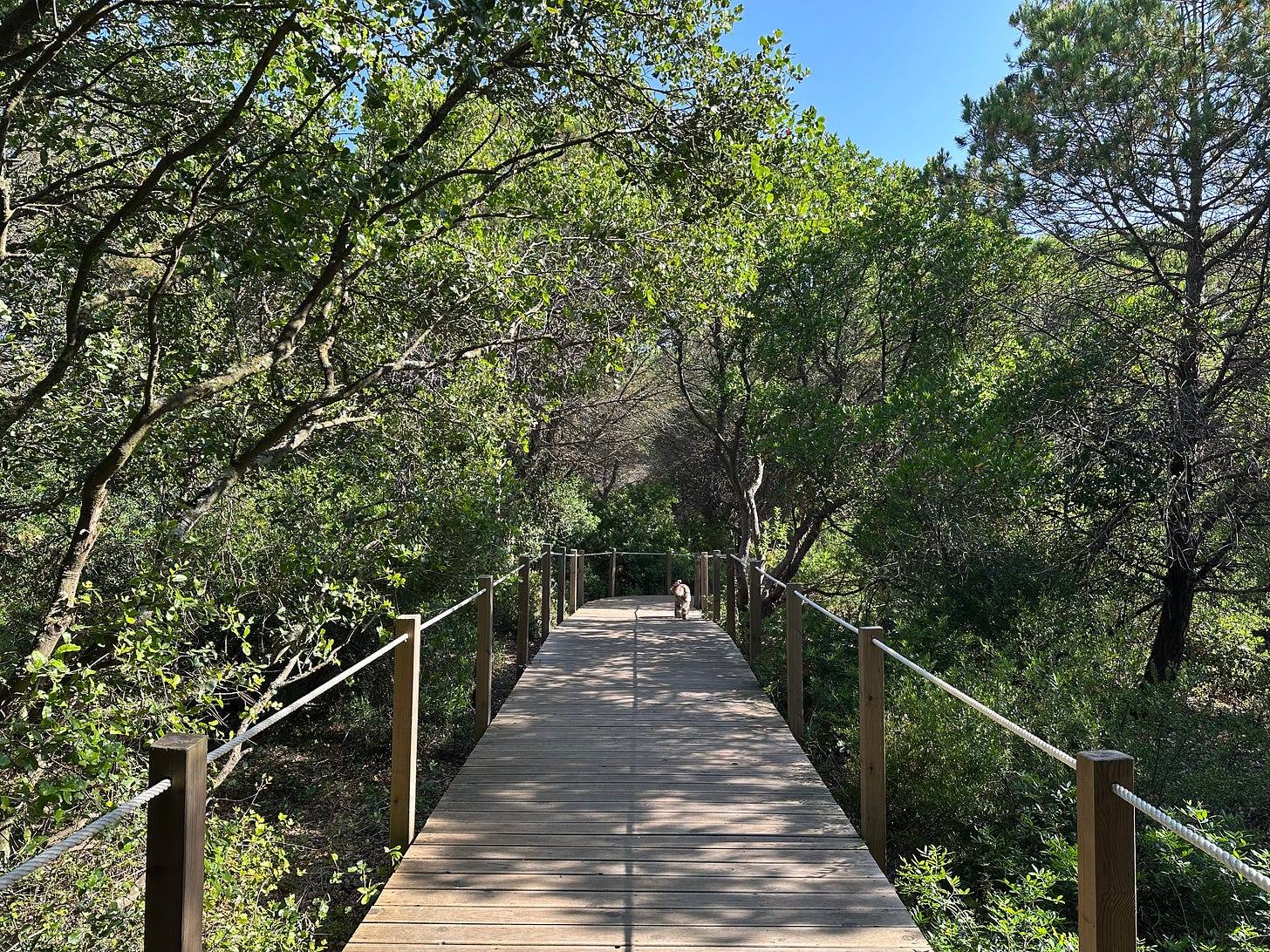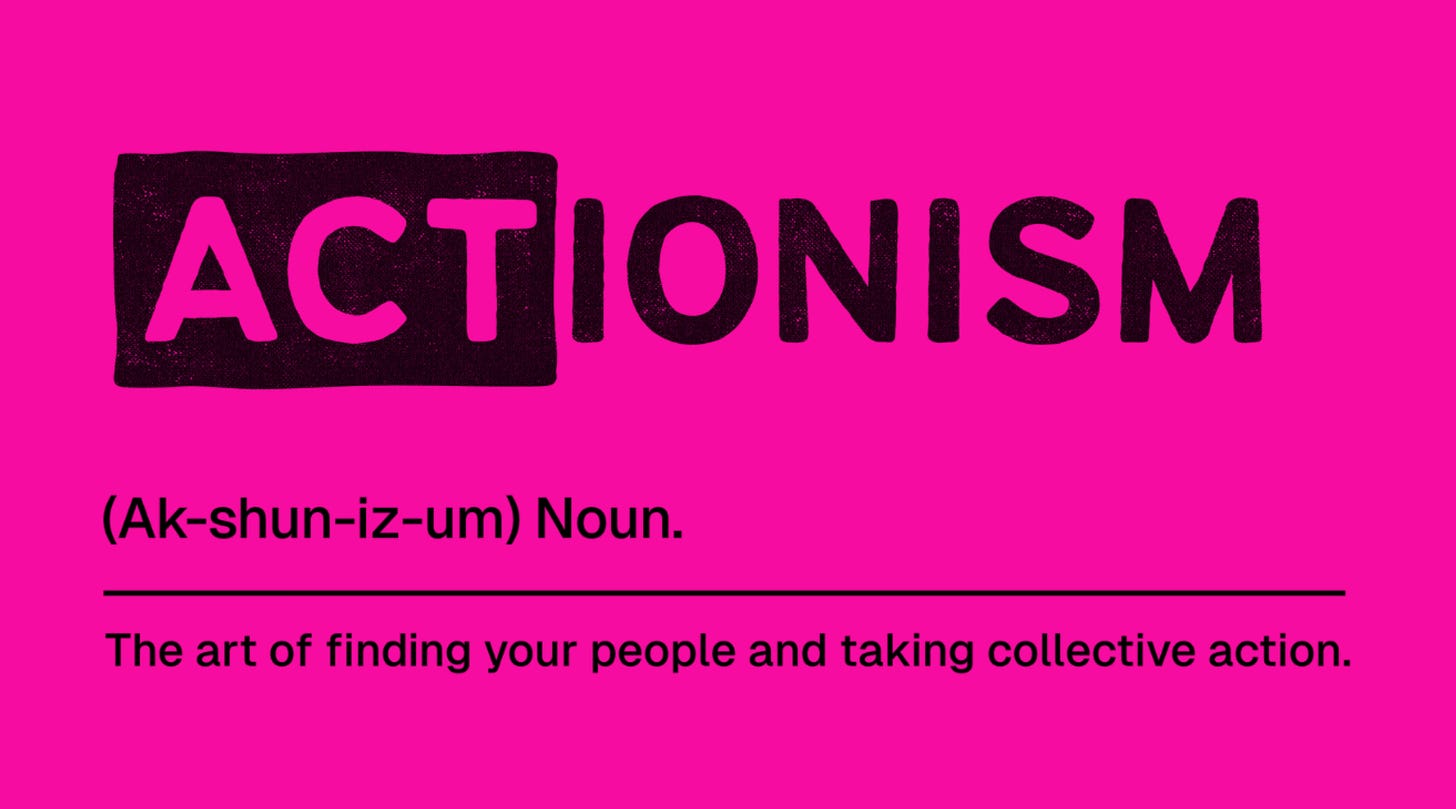Taking action from love not fear, what young men think about the manosphere, and tending to our grief for the world
A monthly digest of inspiring projects, useful resources and opportunities to create systemic change.
Hello and welcome to all my new subscribers!
This is my monthly digest, a collection of inspiring people, projects and resources I’ve come across this month. I look for creative approaches to changemaking, empowering opportunities for support, and uplifting examples of leadership.
These digests aim to give you a big dose of optimism and fresh perspectives to fuel your work leading change. I hope they give you energy, spark new ideas, and remind you that you're not alone in this journey.
It’s a challenging time to be a conscious and committed citizen of the world. Be kind to yourself, move your body, plan something fun to look forward to.
The more of these I curate, the more evidence I see of a growing movement of brilliant people enabling the just transition we so desperately need. Change isn’t coming, it’s already here.
With you always in solidarity and hope,
Gen
p.s. “Pain for the world is not only natural, it is a necessary component of our healing.” - Joanna Macy
Tara Brach’s teachings blend Western psychology and Eastern spiritual practices, mindfulness, and a full, compassionate engagement with our world. She is a much-loved leader in Western Buddhism, offering a thoughtful and caring approach to freeing ourselves from suffering. In this powerful episode, Tara addresses the troubles of our current times by exploring the roots of tyranny and fear, the power of belonging, and inner freedom as a path to outer change. She outlines the role of the spiritual warrior and guides us to take action from love, not fear, explaining how small, heartfelt acts contribute to collective healing and justice. A must-listen if you’re looking for ways to reset and resource yourself.
Hit UK TV series Adolescence reignited a much-needed conversation on the effects of social media and influencers on young men. Unfortunately the boys and men at the centre of these discussions are often only spoken about, rather than spoken with. Movember, a leading charity changing the face of men’s health, is trying to change this by engaging with young men themselves about the influence of this content on their lives and wellbeing. Working in partnership with my former coaching client and brand partner, The Good Side, they’ve surveyed over 3,000 young men aged between 16 and 25, across the UK, US and Australia; creating a first-of-its-kind report and film and offering new insights into both the opportunities and risks associated with online influencers and their content.
The Centre for Climate Psychology offers online learning that brings psychological and systemic resilience and adaptability to the way we think, act and lead in a time of global upheaval. They provide spaces where we can come together across disciplines to collectively make sense of our shifting reality and reclaim agency over the direction of our future. I’m currently doing their Internal Family Systems for Social Transformation course and learning lots. Tending our Grief for the World is a monthly session they offer for people to express and witness the range of feelings that arise in response to our complex times. When we give space to these feelings we bring a deeper sense of connection to self, to others around us, and to our sense of aliveness and care for the world.
Rebecca Solnit is an American writer, historian, and activist known for her powerful works on feminism, western and urban history, popular power, social change and insurrection. She’s the author of over twenty books, including ‘Men Explain Things to Me’, ‘Hope in the Dark’, and ‘A Field Guide to Getting Lost’. Solnit’s work blends memoir, cultural critique, and historical insight to illuminate the connections between personal experience and collective transformation. Her latest book, No Straight Road Takes You There: Essays for Uneven Terrain, she argues for the long-term view and the power of collective action, making a case for seeding change wherever possible, and offering us all a path out of the wilderness.

Branch is transforming how women return to work after maternity leave. The Branch programme, guided by experienced facilitators, brings together a group of women from different organisations returning to their full-time careers. Branch’s goal is to help women channel their ambition and make returning to work an opportunity for accelerated growth. This summer they’re hosting Career Walks in London to help women connect with likeminded mothers who are navigating their professional identities alongside motherhood. Find out more and book here.
My talented friend Dr
Stein Lubrano, a social theorist, author and learning designer, has written a much-needed book called ‘Don’t Talk About Politics: How to Change 21st Century Minds’. Sarah argues that democracy is dying because we’re clinging to a dangerous, outdated myth: that talking about politics changes people’s minds. It doesn’t. Her book explores the actions that actually do, from friendship to community organising to the social infrastructure that shapes how we live and think.Gavin Newsom is the 40th Governor of California, previously serving as the state's Lieutenant Governor and Mayor of San Francisco. He’s known for pioneering progressive reforms, from same-sex marriage and climate policy to criminal justice and healthcare, and advocating for a government that works for all residents. Earlier this month, when President Donald Trump mobilised thousands of national guard troops and 700 marines, ignoring the governor’s objections, to quell protests in LA sparked by immigration raids across the region, Newsom responded with this incredible address to Californians, condemning the President’s choice of “theatrics over public safety.”
In 1925, the Italian intellectual Benedetto Croce wrote the first Manifesto of Anti-Fascist Intellectuals, knowing that he had the right to speak and the duty to respond to the rise of Fascism in Italy. A century later, intellectuals from around the world, including 31 Nobel Prize winners, are raising the alarm and speaking out against the return of Fascism, and asking all democratic citizens to join them. Read more and join the thousands of people supporting the 2025 letter here.
Last week I attended a brilliant online conversation called ‘Activism and the Divided Brain’ between Iain McGilchrist, psychiatrist, neuroscience researcher, philosopher and literary scholar and Anthea Lawson, an award-winning campaigner and author. Anthea has campaigned to shut down tax havens, prevent banks from facilitating corruption and environmental devastation, and control the arms trade. At Global Witness, she launched a campaign that changed the rules on secret company ownership and resulted in new laws in dozens of countries. Prior to human rights work she was a reporter at The Times. Her book, ‘The Entangled Activist: Learning to recognise the master’s tools’, draws on her own experience, critical analysis and interviews with leading activists to explore how activism is entangled in the problems it seeks to solve.
Jon Alexander is Co-Founder of the New Citizen Project, a participation strategy and innovation consultancy with a belief that, given the right opportunity, people can and will shape the things that matter to them for the better. He is also author of the inspiring book, ‘Citizens: Why the Key to Fixing Everything is All of Us’. Over the last nine months he and some collaborators have been experimenting with what they call Citizen Collective, creating a community of practice for the people working to create a Citizen Future: a world rooted in the logic that all of us are smarter than any of us. Being part of this collective has been one of the most uplifting experiences of my year so far, which is why I’m so excited to see them launch a number of new initiatives, one of which is Actionism, a platform for inspiration and finding your people to take collective action with. Jon and his crew have a big vision and they’re scaling their efforts. Sign up to his mailing list for updates on how to get involved.
Stanford Social Innovation Review (SSIR) is an award-winning magazine and website sharing cross-sector solutions to global problems. Written by and for social change leaders across sectors, SSIR advances the field by cultivating and sharing the best in research- and practice-based knowledge. Their recent series, Philanthropy’s Response to the Radical New Reality explores how funders can step up amid shrinking government support, democratic backsliding, and rising global crises. Calling on the philanthropy sector to increase spending, embrace trust-based and flexible funding, support local leadership, and defend its role in civil society, the series offers bold, practical strategies for navigating this urgent and complex moment.
Thanks for reading! Let’s spread some optimism and inspiration. If you found this digest helpful, please hit the 🤍 below and forward it to a colleague or friend.




Great post as always, so many links to explore! Hopefully see you at the July grief circle? I am co-facilitating with Sophy